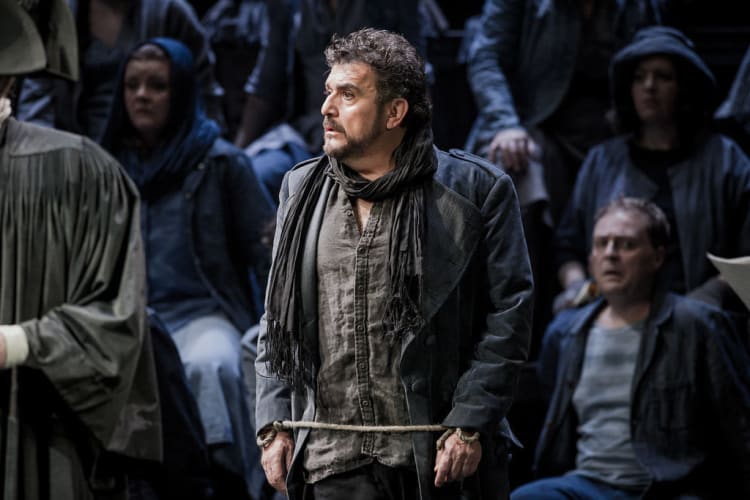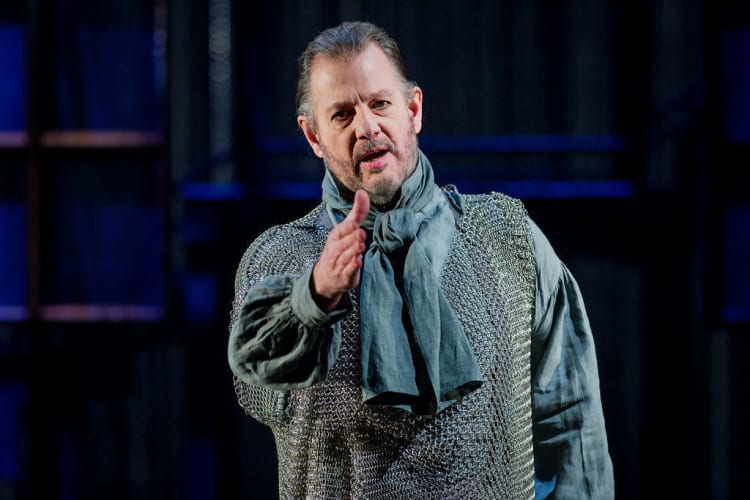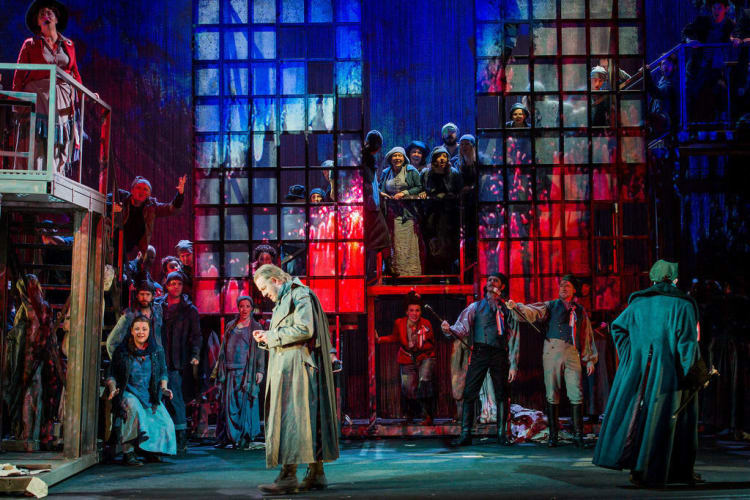Opera North is a company of which the region can be proud. The creative team don’t always get things right but, when they do, they can produce some memorable work. With this production of Giordano’s Andrea Chénier, they have got things very right, indeed.
This may well be the finest Opera North production I have ever seen.
After a nicely framed prologue, showing the poet at work in his garret, the four-act work opens with preparations for a party at the mansion of the Contessa di Coigny. Alone for a moment, her servant, Carlo Gérard angrily laments the inequalities of French society.
The year is 1789, but the Bastille has not yet fallen. An ageing servant wearily drags a harp onstage. The old man is Gérard’s own father, worn down by fifty years of service. His son tells us bitterly that his father’s main achievement in life has been to produce the next generation of servants. Gérard forms the first side of a tragic love triangle.
When the party begins, we meet the other two sides of the triangle. First, the charming, lovely but naive Maddalena, daughter of the Contessa. The eponymous poet enters and, gently mocked by Maddalena, is provoked into reciting a love poem that is as much about social insurrection as it is about human intimacy.
While Maddalena herself is deeply affected by Chénier’s words, the other socialites are offended. The Contessa insists that the party must go on, but their dancing is interrupted by the arrival of peasants, begging for alms. The staging is here is direct and striking—the hands of the chorus reaching through the curtain walls of the ballroom. When the Contessa turns them away, an outraged Gérard casts off his liveried jacket, renouncing his servitude.
The remaining three acts are set five years on, when France is in the grip of the Terror, former heroes of the Revolution are being denounced as traitors, thugs patrol the night streets and neighbour spies upon neighbour. It is against this background that the love triangle plays out with, unusually for an operatic tale, all three principals covering themselves in glory. For two of them, the paths of glory lead but to the guillotine.
Rafael Rojas brings conviction and compassion to the title role. His top note sustain is impressive and his opening aria, "Un dì all'azzurro spazio”, wins the ovation of the season.
On the night, though, Rojas is outdone (albeit marginally) by Robert Hayward’s characterisation of Carlo Gérard. Gérard’s is the most complex character of the piece. Hayward’s voice delivers in full the sense of a decent man whose soul is being ripped at the seams by the competing demands of desire, the corruption of cherished hopes and an implacable sense of what is right.
He has loved Maddalena since they were both children. When, by devious means, she is delivered into his power, Daniel Norman’s deliciously unsentimental Incroyable advises, “women have a heart and a body. Choose the body.” The moral turmoil Gérard endures in his scene with Maddalena is transfixing.
In five years, harsh lessons in life have transformed the naive young woman into one worthy of the love of two exceptional men. Annemarie Kremer convincingly handles the transition from alluring frivolity to profound dignity, making her an admirable foil for Rojas and Hayward.
Fiona Kimm, in a brief cameo as tragic Citizen, Madalon—a blind woman who, having lost her sons in the cause of the Revolution, now offers up her young grandson—sings with heartrending clarity. (Kimm doubles as the contemptuous Contessa).
Rather than parading their self-absorbed artistic “needs”, while grandstanding, roughshod, across the heart of the material, it is a joy to see a highly talented creative team pull together in the cause of enhancing the meaning and dramatic impact of the text.
Joanna Parker’s sets are evocative and malleable, transporting us seamlessly from aristocratic ballroom to dank prison cell, stopping at a kangaroo court and strife-torn Parisian streets along the way. Peter Mumford’s lighting design is a miracle of responsive subtlety and variety, never failing to illuminate (both literally and figuratively) the tone of the moment. As with his work on the highly enjoyable L’Elisir d’ Amore, Tim Claydon has the chorus moving in dramatically significant patterns—the sequence where the mob crowd downstage, baying for blood, is genuinely intimidating.
The contributions of Dick Straker (video and projection design) and Pete Malkin (sound design) are integral to the success of the production. Instead of the customary ‘dead time’ during scene changes, they give us aural and visual impressions of revolution and the Terror. Fragments of Chénier’s poems, mingled with Revolutionary documents, seep through the gauze, and is that the sound of tumbrils, ferrying “traitors” to a final reckoning?
The entire experience is visually, melodically and emotionally compelling—all credit to director Annabel Arden for weaving it all together. Conductor Oliver von Dohnányi caresses and urges his orchestra to an acoustically dynamic rendition of Giordano’s score.
As with football crowds, operatic audiences have a tendency to stream out at the earliest opportunity, in direct proportion to their appreciation of what they have just witnessed. Tonight, amidst the ovations, I see only one early departure, his body language apologetic, even shamefaced. Poor man. How desperate he must be to catch that early tram.


